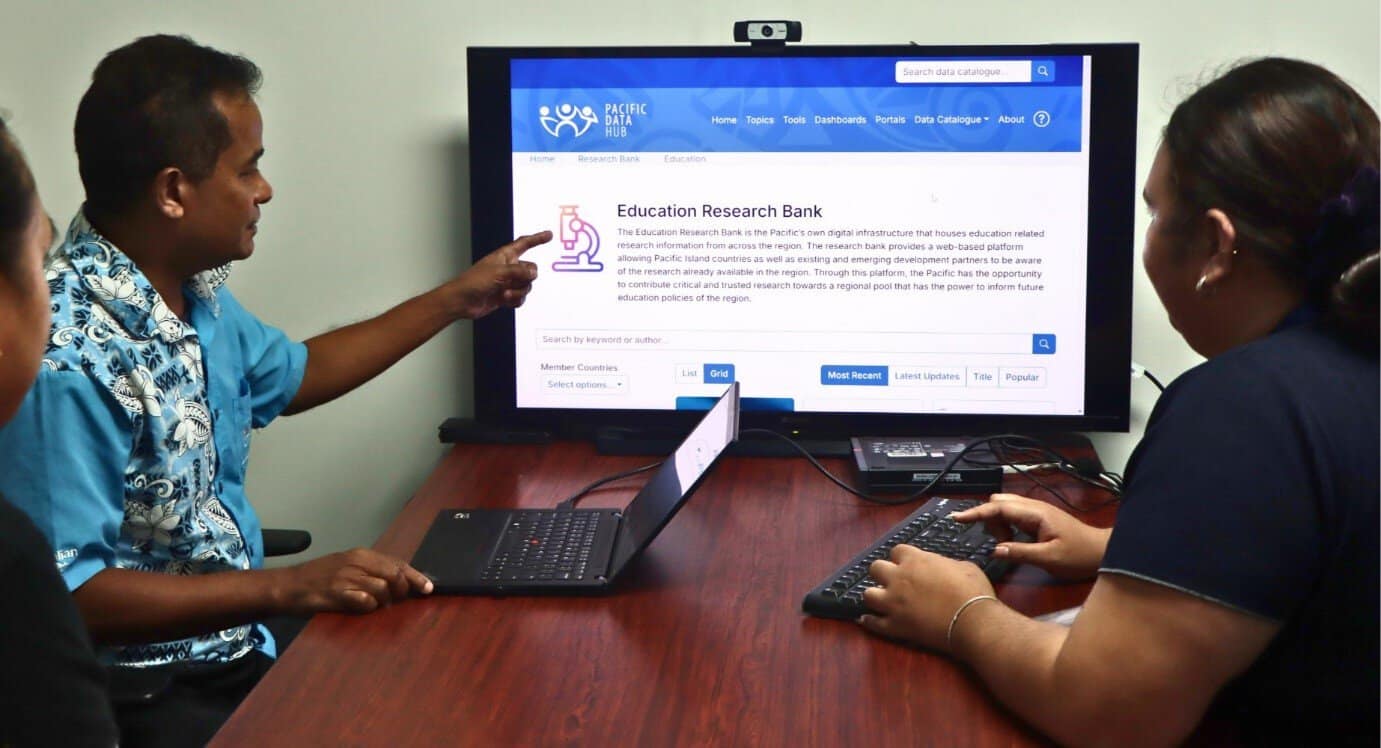| In celebration of this year’s International Literacy Day, the Pacific Community’s (SPC) Educational Quality and Assessment Programme (EQAP) and the SPC-coordinated Pacific Data Hub are proud to unveil the Pacific’s own Education Research Bank. The bank is a Pacific-developed digital infrastructure designed to transform the way education-related research is stored, accessed and shared across the region. Education ministries from the Blue Pacific continent voiced a shared concern at the 2021 Pacific Education Research Network (PERN) meeting. These representatives were concerned about the loss of knowledge products including reports and data sets due to inadequate storage, staff turnover, and weak information management practises. These challenges, accompanied by the high cost of accessing research publications, highlighted a critical gap in the region’s educational infrastructure. The idea of designing and launching a regional research bank was borne out of this shared regional concern. The proposal for a centralised repository for education-related research was met with widespread enthusiasm and support. This initiative has now come into fruition with the finalisation of the research bank, signifying a leap forward in the preservation and promotion of educational research in the Pacific. With two primary goals, the research bank aims to safeguard the wealth of knowledge produced by Pacific education ministries and to make these resources accessible to policymakers, scholars and students. By providing a secure and open-access digital platform, the research bank ensures that knowledge products such as reports, journals, publications, videos, and datasets are preserved for future use and are readily available. This initiative is also particularly important for researchers working outside of academia, who often struggle with restricted access to peer-reviewed journals due to costly paywalls. The research bank aims to overcome these barriers by offering a no-cost, regional platform dedicated to featuring Pacific research, empowering local researchers and ensuring that research outputs are accessible to all in the region. Developed by SPC’s Pacific Data Hub team, the research bank is hosted on Pacific Education Research Bank: Advancing Educational Research and Knowledge Sharing the Pacific Data Hub portal, offering a secure and robust digital platform that provides advanced content management and security capabilities. Countries in the region can voluntarily deposit their research products into the bank, maintaining full control over what is shared and how it is accessed. A Pacific-led community good, the Pacific Data Hub (pacificdata.org) is an online gateway to comprehensive data and information ‘about the Pacific, by the Pacific’. As well as the education research bank, the SPC-coordinated platform serves as a single-entry point to Pacific datasets, publications, dashboards and other tools, with financial support from New Zealand’s Ministry of Foreign Affairs and Trade. One of the key features of the research bank enabled by the Pacific Data Hub is its flexibility in access control, allowing contributors from Pacific Island countries to determine whether their research is fully open to the public or subject to restricted access. In cases where resources are restricted, anyone wishing to view the content can request for permission, and the decision to approve or deny the request lies with designated focal point of the respective country. Another key feature of the research bank is that it incorporates a quality assurance process, where all materials submitted are reviewed to meet the standards set by the contributing countries. This vetting process, combined with regular updates on metadata, site access, and downloads, ensures that the Research Bank remains a reliable and valuable resource for the Pacific region. As of its launch, the Pacific Education Research Bank houses 25 research papers from eight Pacific Island countries, with 17 more papers currently being reviewed for publishing in the near future. This early accomplishment reflects the enthusiasm and dedication of the region’s education ministries to contribute their knowledge and support the collective advancement of education in the Pacific. Looking ahead, EQAP will continue to work closely with member countries to encourage regular updates and contributions to the Research Bank. This ongoing collaboration will help keep the platform up to date, relevant, and reflective of the latest research efforts conducted in the region. For more information and to explore the Pacific Education Research Bank, visit: https://research-bank.pacificdata.org/education |
